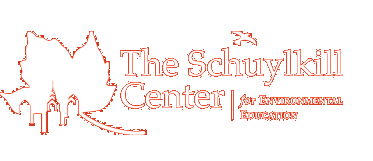Like all businesses, nonprofits, and even families, the Schuylkill Center has been struggling through the pandemic and the now-two-months-and-counting lockdown. While hikers and families have happily discovered the benefits of our 340 acres of forests and meadows, our staff is chafing to return, and we’re waiting for the science (and the governor) to tell us when this might happen.
It might surprise you to learn that we hire more than 50 employees: educators who lead school field trips on environmental science, rehabilitators who heal injured and sick wild animals, preschool teachers who use our forest as their classroom, artists who install exhibitions in our gallery and along our trails, and all the support staff this activity requires: a fundraising staff, a finance staff, a crew managing our land and facilities, and so much more.
On Friday, March 13th, a date seared forever into my memory, we sent everyone home, including staff and preschoolers. Schools stopped coming for visits; we cancelled programming initially through March, and now of course into April and May. Our finances fell off a cliff: one projection showed revenue dropping 70% in this quarter from budgeted expectations.
We carried those employees through the first month, paying them all and retaining their health benefits, whether or not they were able to perform their jobs remotely (it’s hard to mow virtual trails, for example). But we couldn’t continue this forever–the pandemic was outlasting everyone’s patience and our cash. So, on April 10 we furloughed most of the staff, retaining a skeleton crew of people to run the business: maintenance staff to make sure the buildings were secure and all systems operating; a finance crew to pay the bills; a fundraising crew to try to bring additional donations into the organization; a wildlife rehabilitation team to care for the animals in or Wildlife Clinic; and more. But not much more.
Here’s every executive director’s nightmare: to host a Zoom call for 50 people and tell most of them they are about to be furloughed. Neither easy nor fun, it was essential, as we simply ran out of the ability to retain our staff, and anyone who stayed on in the skeleton crew had either their salaries or hours reduced–the pain was shared among all 50 of us. But I was relieved that our Board of Trustees, the wonderful volunteers who make sure our organization is pointed in the right direction, agreed that we not only keep all furloughed employees on our group healthcare plan, but we foot the bill for the entire benefit, as there was no longer any salary to deduct the employee’s share from. We were not going to launch our staff into a pandemic without health coverage.
But then an extraordinary thing happened: during the first week of furlough, we got word from our bank, S&T Bank, the new name for the bank on Ridge Avenue not far from the new pocket park, that we had successfully secured one of the coveted but controversial Paycheck Protection Program grants from the Small Business Administration. It was Christmas in April: the furlough lasted only one week for the lion’s share of our staff.
There is a surprise here. One month later, both us and the bank are still wrestling with the program’s murky requirements, especially whether or not the loan is forgiven. (Just talked with our banker, and it is as clear as mud–no fault of the bank at all.) Still, while you might have read about controversies around this program, this one nonprofit at least greatly benefited: without the loan, our people would have remained on furlough and would have been tapping into the state’s overtaxed unemployment compensation program. Say what you will, it worked for us. In spades.
We are, of course, among the lucky ones, as we received the loan; so many sister nonprofits and businesses are still waiting to hear if their PPP ship has sailed in. I’d like to personally thank S&T Bank for being on top of this program–that has been a godsend.
Suddenly it is mid-May, and we are staring at two new hurdles in front of us. For one, our summer camp usually starts in early June, and a cohort of summer camp counselors still expect to show up to work with us this summer. We have exactly zero clarity on whether or not this happens right now, and our staff is doggedly trying to prepare for all scenarios at once, everything from a full summer of camp to a greatly reduced camp, whichever that virus throws at us.
Second, the PPP money runs out in June, which back in April read as tiding us over until summer camp revenue would kick in to support our operations and our staff. That is no longer a certainty. So a possibility exists that in mid-June we end up exactly where we were in mid-April: staring at an unending lockdown with cash again running low.
Like you, I’m waiting for this rollercoaster ride to end, urging our staff to be patient, and praying for something akin to a miracle, a summer free from the virus, one that allows families to pick up the pieces of our shattered lives.
That’s how the Schuylkill Center is doing.
By Mike Weilbacher, Executive Director

